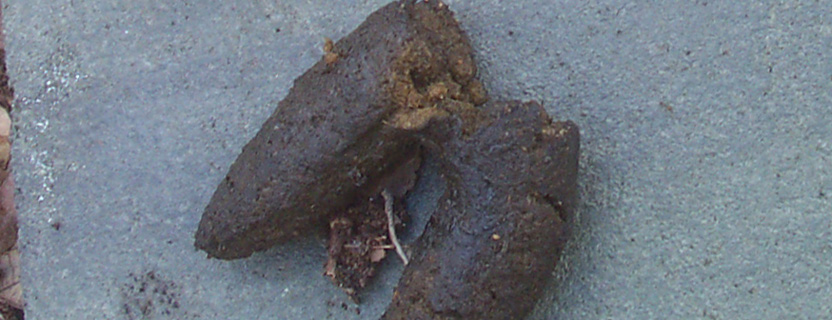NEED LOCAL HELP? We have
wildlife removal professionals servicing 95% of the USA. Click
here to hire a
local raccoon removal expert in your home town. Updated
2018. But read the below advice first!
Yes. There’s absolutely no doubt about it, raccoon feces are
very dangerous to touch or breathe. Raccoons carry diseases that
can be contracted by our pets and even by us. If you have a
raccoon infestation in your attic (or anywhere else on your
property), you will be able to clearly see their toilet, too.
So, yeah, you never just have a raccoon den in your attic, you
also have a raccoon latrine in there. And while they sometimes
restrict their pooping area to a tight section, it’s more common
for them to leave their excrements and urine all over the place.
Raccoon infestation equals fecal contamination.

So, what is toxic about raccoon feces? Raccoons carry a
parasitic disease, roundworm. And while this disease doesn’t
affect them, it can be very dangerous for humans, being able to
cause neurological damage and even death. The raccoons excrete
this parasitic worm and its eggs in their feces. If exposed to
this eggs, we can become infected. The roundworm eggs expelled
by raccoons are extremely resilient, being able to survive
extreme temperatures, both cold and hot. Once the eggs dry, they
become airborne.
We can get roundworm either by touching the feces with our hands
or by breathing in contaminated dust particles once the eggs are
airborne. Although as not as dangerous as the roundworm, raccoon
feces may also contain giardia, a flagellated parasite that also
presents a threat to us. Raccoon urine is equally dangerous, and
can carry a bacterial infection that poses a major threat to our
kidney function – leptospirosis.
Decontaminating a previously raccoon infested area is paramount.
If you’ve just solved your attic raccoon problem, it is very
important that you don’t start resting on your laurels just yet.
A complete decontamination includes cleaning your attic. And
there are important rules to this. First off, no matter how
disgusting you might find handpicking excrements, it’s really
the only safe way to do it. By using a broom or by vacuuming,
you increase the risk of dangerous air particles raising, hence
increasing the risk of contracting the roundworm parasite. If
raccoons made their business in your attic, your insulation is
probably compromised. If you find droppings on the insulation,
there’s no doubt about it, you have to get rid of it. But even
if you don’t find excrements directly on the insulation, I would
still pull it up and throw it away.
We can answer: How Long Does It Take to Remove Raccoons in a Building?
Not properly cleaning up your attic can lead to major ulterior
health risks, but not wearing adequate protection gear while
doing so is equally – if not more – dangerous. Ideally, you
should wear a biohazard suit, a respirator facemask, eye
protection, and gloves. After the cleanup is complete, all the
protective gear should be put in a bag and disposed of (burning
the gear is even better). I know, it sounds like a hassle. And
it is. On the bright side, it won’t be such a hassle to find a
local wildlife removal company that also offers cleaning
services, so you always have that option.
Go back to the Raccoons in the attic
home page.